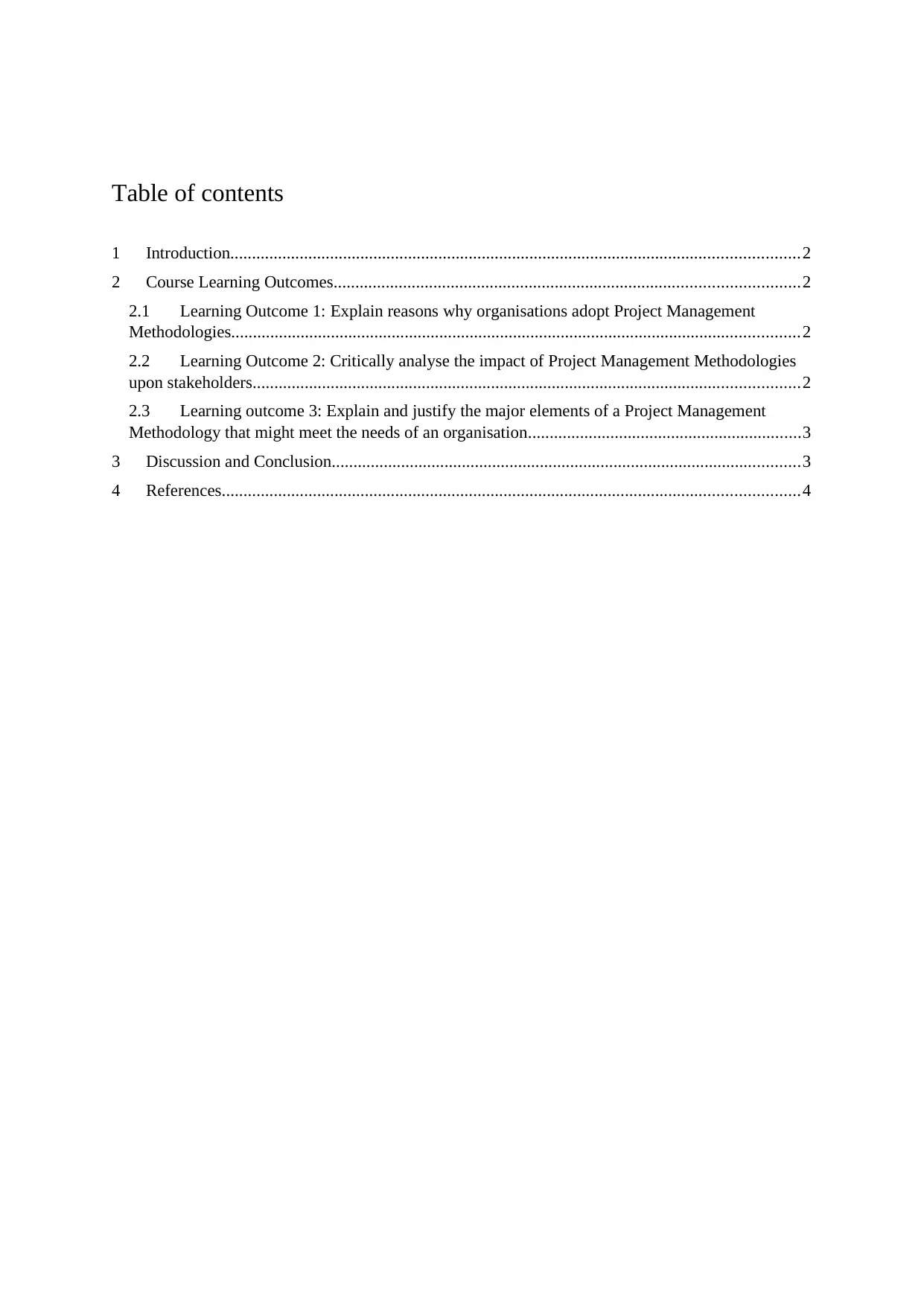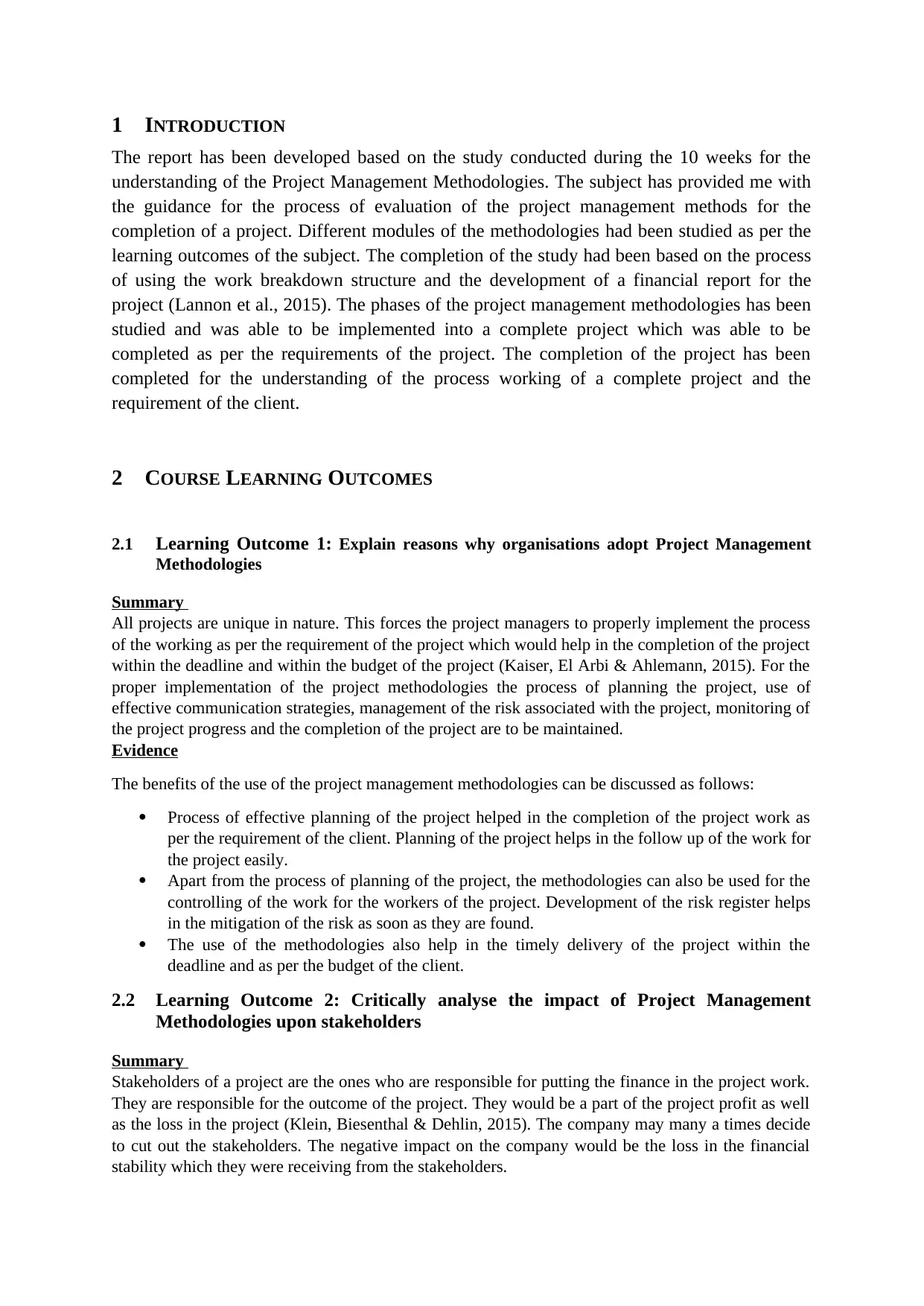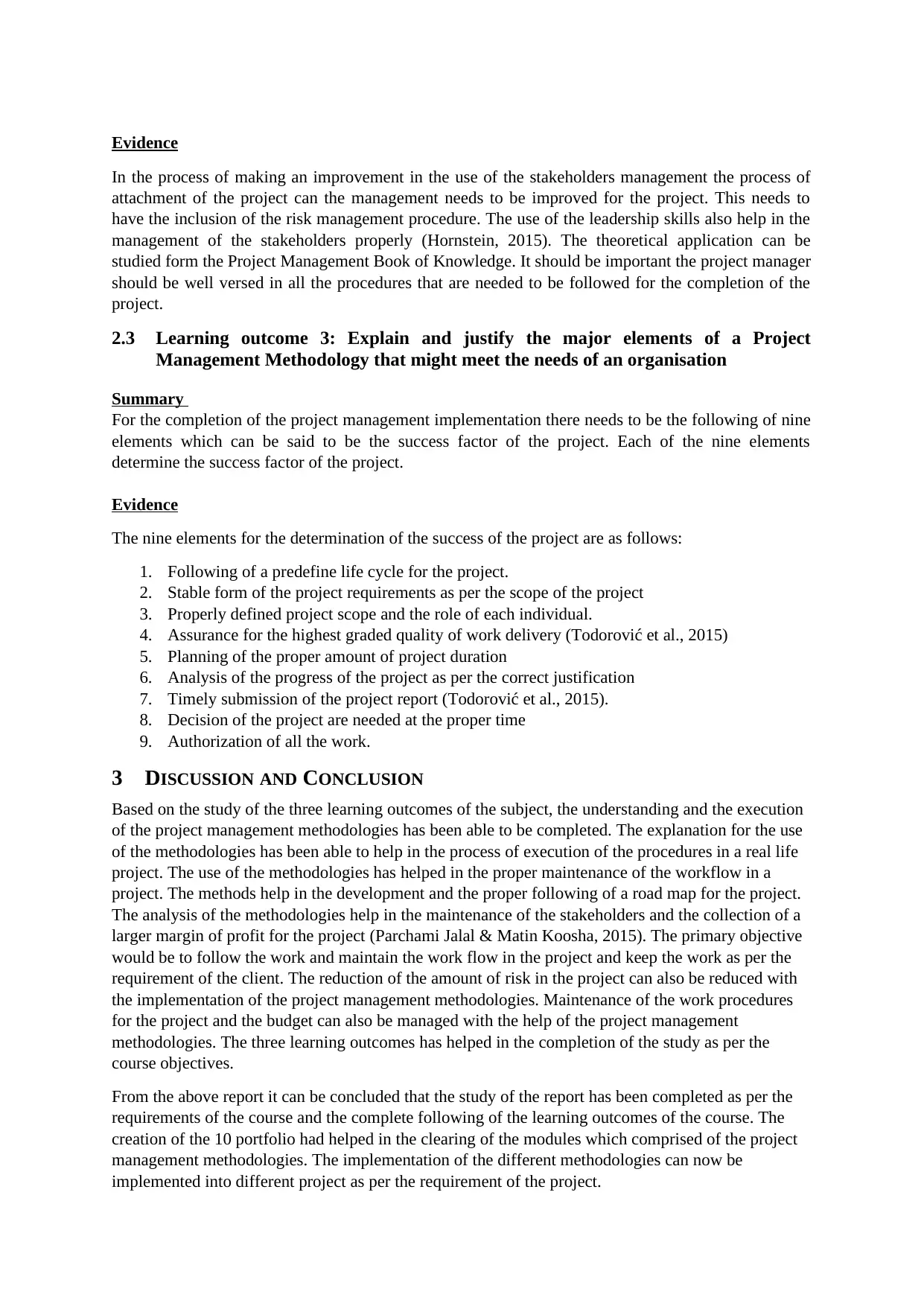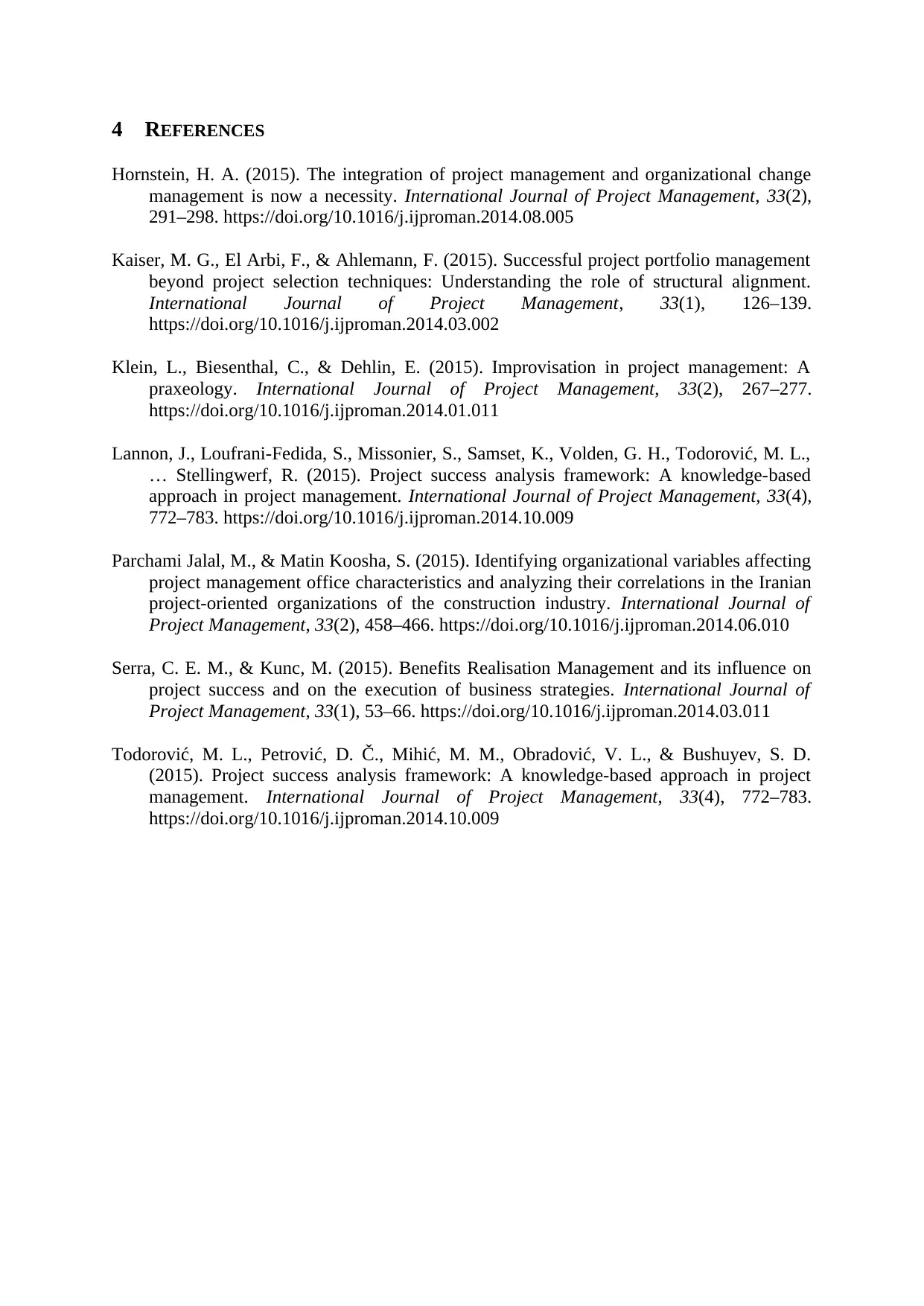Project Management Methodologies: Elements and Justification
VerifiedAdded on 2023/06/15
|5
|1569
|265
Report
AI Summary
This report examines the reasons organizations adopt project management methodologies, the impact of these methodologies on stakeholders, and the major elements that meet organizational needs. It covers planning, communication, risk management, and monitoring project progress, highlighting the benefits of effective project management in meeting deadlines and budgets. The report also analyzes the role of stakeholders and the importance of stakeholder management, emphasizing the need for risk management and leadership skills. Furthermore, it identifies nine key elements for project success, including a defined project lifecycle, stable requirements, clear scope, quality assurance, and timely reporting. The study concludes that project management methodologies are crucial for maintaining workflow, managing budgets, and reducing project risks, aligning with the course objectives and learning outcomes. Desklib provides access to similar solved assignments and resources for students.

Table of contents
1 Introduction...................................................................................................................................2
2 Course Learning Outcomes...........................................................................................................2
2.1 Learning Outcome 1: Explain reasons why organisations adopt Project Management
Methodologies...................................................................................................................................2
2.2 Learning Outcome 2: Critically analyse the impact of Project Management Methodologies
upon stakeholders..............................................................................................................................2
2.3 Learning outcome 3: Explain and justify the major elements of a Project Management
Methodology that might meet the needs of an organisation...............................................................3
3 Discussion and Conclusion............................................................................................................3
4 References.....................................................................................................................................4
1 Introduction...................................................................................................................................2
2 Course Learning Outcomes...........................................................................................................2
2.1 Learning Outcome 1: Explain reasons why organisations adopt Project Management
Methodologies...................................................................................................................................2
2.2 Learning Outcome 2: Critically analyse the impact of Project Management Methodologies
upon stakeholders..............................................................................................................................2
2.3 Learning outcome 3: Explain and justify the major elements of a Project Management
Methodology that might meet the needs of an organisation...............................................................3
3 Discussion and Conclusion............................................................................................................3
4 References.....................................................................................................................................4
Paraphrase This Document
Need a fresh take? Get an instant paraphrase of this document with our AI Paraphraser

1 INTRODUCTION
The report has been developed based on the study conducted during the 10 weeks for the
understanding of the Project Management Methodologies. The subject has provided me with
the guidance for the process of evaluation of the project management methods for the
completion of a project. Different modules of the methodologies had been studied as per the
learning outcomes of the subject. The completion of the study had been based on the process
of using the work breakdown structure and the development of a financial report for the
project (Lannon et al., 2015). The phases of the project management methodologies has been
studied and was able to be implemented into a complete project which was able to be
completed as per the requirements of the project. The completion of the project has been
completed for the understanding of the process working of a complete project and the
requirement of the client.
2 COURSE LEARNING OUTCOMES
2.1 Learning Outcome 1: Explain reasons why organisations adopt Project Management
Methodologies
Summary
All projects are unique in nature. This forces the project managers to properly implement the process
of the working as per the requirement of the project which would help in the completion of the project
within the deadline and within the budget of the project (Kaiser, El Arbi & Ahlemann, 2015). For the
proper implementation of the project methodologies the process of planning the project, use of
effective communication strategies, management of the risk associated with the project, monitoring of
the project progress and the completion of the project are to be maintained.
Evidence
The benefits of the use of the project management methodologies can be discussed as follows:
Process of effective planning of the project helped in the completion of the project work as
per the requirement of the client. Planning of the project helps in the follow up of the work for
the project easily.
Apart from the process of planning of the project, the methodologies can also be used for the
controlling of the work for the workers of the project. Development of the risk register helps
in the mitigation of the risk as soon as they are found.
The use of the methodologies also help in the timely delivery of the project within the
deadline and as per the budget of the client.
2.2 Learning Outcome 2: Critically analyse the impact of Project Management
Methodologies upon stakeholders
Summary
Stakeholders of a project are the ones who are responsible for putting the finance in the project work.
They are responsible for the outcome of the project. They would be a part of the project profit as well
as the loss in the project (Klein, Biesenthal & Dehlin, 2015). The company may many a times decide
to cut out the stakeholders. The negative impact on the company would be the loss in the financial
stability which they were receiving from the stakeholders.
The report has been developed based on the study conducted during the 10 weeks for the
understanding of the Project Management Methodologies. The subject has provided me with
the guidance for the process of evaluation of the project management methods for the
completion of a project. Different modules of the methodologies had been studied as per the
learning outcomes of the subject. The completion of the study had been based on the process
of using the work breakdown structure and the development of a financial report for the
project (Lannon et al., 2015). The phases of the project management methodologies has been
studied and was able to be implemented into a complete project which was able to be
completed as per the requirements of the project. The completion of the project has been
completed for the understanding of the process working of a complete project and the
requirement of the client.
2 COURSE LEARNING OUTCOMES
2.1 Learning Outcome 1: Explain reasons why organisations adopt Project Management
Methodologies
Summary
All projects are unique in nature. This forces the project managers to properly implement the process
of the working as per the requirement of the project which would help in the completion of the project
within the deadline and within the budget of the project (Kaiser, El Arbi & Ahlemann, 2015). For the
proper implementation of the project methodologies the process of planning the project, use of
effective communication strategies, management of the risk associated with the project, monitoring of
the project progress and the completion of the project are to be maintained.
Evidence
The benefits of the use of the project management methodologies can be discussed as follows:
Process of effective planning of the project helped in the completion of the project work as
per the requirement of the client. Planning of the project helps in the follow up of the work for
the project easily.
Apart from the process of planning of the project, the methodologies can also be used for the
controlling of the work for the workers of the project. Development of the risk register helps
in the mitigation of the risk as soon as they are found.
The use of the methodologies also help in the timely delivery of the project within the
deadline and as per the budget of the client.
2.2 Learning Outcome 2: Critically analyse the impact of Project Management
Methodologies upon stakeholders
Summary
Stakeholders of a project are the ones who are responsible for putting the finance in the project work.
They are responsible for the outcome of the project. They would be a part of the project profit as well
as the loss in the project (Klein, Biesenthal & Dehlin, 2015). The company may many a times decide
to cut out the stakeholders. The negative impact on the company would be the loss in the financial
stability which they were receiving from the stakeholders.

Evidence
In the process of making an improvement in the use of the stakeholders management the process of
attachment of the project can the management needs to be improved for the project. This needs to
have the inclusion of the risk management procedure. The use of the leadership skills also help in the
management of the stakeholders properly (Hornstein, 2015). The theoretical application can be
studied form the Project Management Book of Knowledge. It should be important the project manager
should be well versed in all the procedures that are needed to be followed for the completion of the
project.
2.3 Learning outcome 3: Explain and justify the major elements of a Project
Management Methodology that might meet the needs of an organisation
Summary
For the completion of the project management implementation there needs to be the following of nine
elements which can be said to be the success factor of the project. Each of the nine elements
determine the success factor of the project.
Evidence
The nine elements for the determination of the success of the project are as follows:
1. Following of a predefine life cycle for the project.
2. Stable form of the project requirements as per the scope of the project
3. Properly defined project scope and the role of each individual.
4. Assurance for the highest graded quality of work delivery (Todorović et al., 2015)
5. Planning of the proper amount of project duration
6. Analysis of the progress of the project as per the correct justification
7. Timely submission of the project report (Todorović et al., 2015).
8. Decision of the project are needed at the proper time
9. Authorization of all the work.
3 DISCUSSION AND CONCLUSION
Based on the study of the three learning outcomes of the subject, the understanding and the execution
of the project management methodologies has been able to be completed. The explanation for the use
of the methodologies has been able to help in the process of execution of the procedures in a real life
project. The use of the methodologies has helped in the proper maintenance of the workflow in a
project. The methods help in the development and the proper following of a road map for the project.
The analysis of the methodologies help in the maintenance of the stakeholders and the collection of a
larger margin of profit for the project (Parchami Jalal & Matin Koosha, 2015). The primary objective
would be to follow the work and maintain the work flow in the project and keep the work as per the
requirement of the client. The reduction of the amount of risk in the project can also be reduced with
the implementation of the project management methodologies. Maintenance of the work procedures
for the project and the budget can also be managed with the help of the project management
methodologies. The three learning outcomes has helped in the completion of the study as per the
course objectives.
From the above report it can be concluded that the study of the report has been completed as per the
requirements of the course and the complete following of the learning outcomes of the course. The
creation of the 10 portfolio had helped in the clearing of the modules which comprised of the project
management methodologies. The implementation of the different methodologies can now be
implemented into different project as per the requirement of the project.
In the process of making an improvement in the use of the stakeholders management the process of
attachment of the project can the management needs to be improved for the project. This needs to
have the inclusion of the risk management procedure. The use of the leadership skills also help in the
management of the stakeholders properly (Hornstein, 2015). The theoretical application can be
studied form the Project Management Book of Knowledge. It should be important the project manager
should be well versed in all the procedures that are needed to be followed for the completion of the
project.
2.3 Learning outcome 3: Explain and justify the major elements of a Project
Management Methodology that might meet the needs of an organisation
Summary
For the completion of the project management implementation there needs to be the following of nine
elements which can be said to be the success factor of the project. Each of the nine elements
determine the success factor of the project.
Evidence
The nine elements for the determination of the success of the project are as follows:
1. Following of a predefine life cycle for the project.
2. Stable form of the project requirements as per the scope of the project
3. Properly defined project scope and the role of each individual.
4. Assurance for the highest graded quality of work delivery (Todorović et al., 2015)
5. Planning of the proper amount of project duration
6. Analysis of the progress of the project as per the correct justification
7. Timely submission of the project report (Todorović et al., 2015).
8. Decision of the project are needed at the proper time
9. Authorization of all the work.
3 DISCUSSION AND CONCLUSION
Based on the study of the three learning outcomes of the subject, the understanding and the execution
of the project management methodologies has been able to be completed. The explanation for the use
of the methodologies has been able to help in the process of execution of the procedures in a real life
project. The use of the methodologies has helped in the proper maintenance of the workflow in a
project. The methods help in the development and the proper following of a road map for the project.
The analysis of the methodologies help in the maintenance of the stakeholders and the collection of a
larger margin of profit for the project (Parchami Jalal & Matin Koosha, 2015). The primary objective
would be to follow the work and maintain the work flow in the project and keep the work as per the
requirement of the client. The reduction of the amount of risk in the project can also be reduced with
the implementation of the project management methodologies. Maintenance of the work procedures
for the project and the budget can also be managed with the help of the project management
methodologies. The three learning outcomes has helped in the completion of the study as per the
course objectives.
From the above report it can be concluded that the study of the report has been completed as per the
requirements of the course and the complete following of the learning outcomes of the course. The
creation of the 10 portfolio had helped in the clearing of the modules which comprised of the project
management methodologies. The implementation of the different methodologies can now be
implemented into different project as per the requirement of the project.
⊘ This is a preview!⊘
Do you want full access?
Subscribe today to unlock all pages.

Trusted by 1+ million students worldwide

Paraphrase This Document
Need a fresh take? Get an instant paraphrase of this document with our AI Paraphraser

4 REFERENCES
Hornstein, H. A. (2015). The integration of project management and organizational change
management is now a necessity. International Journal of Project Management, 33(2),
291–298. https://doi.org/10.1016/j.ijproman.2014.08.005
Kaiser, M. G., El Arbi, F., & Ahlemann, F. (2015). Successful project portfolio management
beyond project selection techniques: Understanding the role of structural alignment.
International Journal of Project Management, 33(1), 126–139.
https://doi.org/10.1016/j.ijproman.2014.03.002
Klein, L., Biesenthal, C., & Dehlin, E. (2015). Improvisation in project management: A
praxeology. International Journal of Project Management, 33(2), 267–277.
https://doi.org/10.1016/j.ijproman.2014.01.011
Lannon, J., Loufrani-Fedida, S., Missonier, S., Samset, K., Volden, G. H., Todorović, M. L.,
… Stellingwerf, R. (2015). Project success analysis framework: A knowledge-based
approach in project management. International Journal of Project Management, 33(4),
772–783. https://doi.org/10.1016/j.ijproman.2014.10.009
Parchami Jalal, M., & Matin Koosha, S. (2015). Identifying organizational variables affecting
project management office characteristics and analyzing their correlations in the Iranian
project-oriented organizations of the construction industry. International Journal of
Project Management, 33(2), 458–466. https://doi.org/10.1016/j.ijproman.2014.06.010
Serra, C. E. M., & Kunc, M. (2015). Benefits Realisation Management and its influence on
project success and on the execution of business strategies. International Journal of
Project Management, 33(1), 53–66. https://doi.org/10.1016/j.ijproman.2014.03.011
Todorović, M. L., Petrović, D. Č., Mihić, M. M., Obradović, V. L., & Bushuyev, S. D.
(2015). Project success analysis framework: A knowledge-based approach in project
management. International Journal of Project Management, 33(4), 772–783.
https://doi.org/10.1016/j.ijproman.2014.10.009
Hornstein, H. A. (2015). The integration of project management and organizational change
management is now a necessity. International Journal of Project Management, 33(2),
291–298. https://doi.org/10.1016/j.ijproman.2014.08.005
Kaiser, M. G., El Arbi, F., & Ahlemann, F. (2015). Successful project portfolio management
beyond project selection techniques: Understanding the role of structural alignment.
International Journal of Project Management, 33(1), 126–139.
https://doi.org/10.1016/j.ijproman.2014.03.002
Klein, L., Biesenthal, C., & Dehlin, E. (2015). Improvisation in project management: A
praxeology. International Journal of Project Management, 33(2), 267–277.
https://doi.org/10.1016/j.ijproman.2014.01.011
Lannon, J., Loufrani-Fedida, S., Missonier, S., Samset, K., Volden, G. H., Todorović, M. L.,
… Stellingwerf, R. (2015). Project success analysis framework: A knowledge-based
approach in project management. International Journal of Project Management, 33(4),
772–783. https://doi.org/10.1016/j.ijproman.2014.10.009
Parchami Jalal, M., & Matin Koosha, S. (2015). Identifying organizational variables affecting
project management office characteristics and analyzing their correlations in the Iranian
project-oriented organizations of the construction industry. International Journal of
Project Management, 33(2), 458–466. https://doi.org/10.1016/j.ijproman.2014.06.010
Serra, C. E. M., & Kunc, M. (2015). Benefits Realisation Management and its influence on
project success and on the execution of business strategies. International Journal of
Project Management, 33(1), 53–66. https://doi.org/10.1016/j.ijproman.2014.03.011
Todorović, M. L., Petrović, D. Č., Mihić, M. M., Obradović, V. L., & Bushuyev, S. D.
(2015). Project success analysis framework: A knowledge-based approach in project
management. International Journal of Project Management, 33(4), 772–783.
https://doi.org/10.1016/j.ijproman.2014.10.009
1 out of 5
Related Documents
Your All-in-One AI-Powered Toolkit for Academic Success.
+13062052269
info@desklib.com
Available 24*7 on WhatsApp / Email
![[object Object]](/_next/static/media/star-bottom.7253800d.svg)
Unlock your academic potential
Copyright © 2020–2025 A2Z Services. All Rights Reserved. Developed and managed by ZUCOL.
